Leroy "Nicky" Barnes sold so much heroin and evaded convictions for so long that he earned the nickname "Mr. Untouchable" and actually challenged the police to catch him.
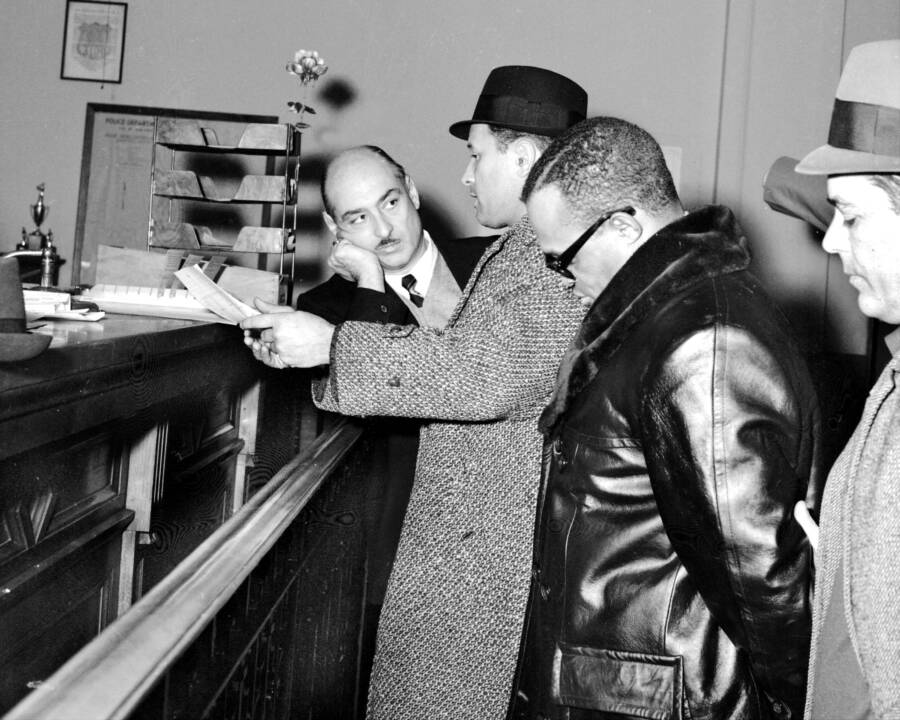
Ossie LeViness/NY Daily News Archive/Getty ImagesAssistant District Attorney David Blatt (left) and detectives wait as Nicky Barnes, a.k.a. “Mr. Untouchable,” is booked at a Bronx police station.
Nicky Barnes was once quite open about how he’d amassed his fortune. The notorious drug kingpin got rich by flooding Harlem and other black neighborhoods of the 1960s and ’70s with heroin, then smartly invested those profits in legal endeavors like real estate.
And through it all, Barnes certainly lived up to his nickname, “Mr. Untouchable,” until his conviction in 1977. According to The New York Times, the extravagant pusher owned hundreds of suits, 100 pairs of custom shoes, countless luxury cars, and numerous properties for his wife and many girlfriends.
He was so emboldened by the money coming in and the local support and adoration from the communities he was poisoning that he essentially dared the government to beat him at his own game. His cover feature in a 1977 issue of The New York Times Magazine couldn’t have made that more clear.
Nicky Barnes, ‘Mr. Untouchable’ of Heroin Dealers, Is Dead at 78 – https://t.co/3GmHk7dtEu –
“Nicky Barnes is not around anymore,” said the balding, limping grandfather in the baggy Lee dungarees.
“Nicky Barnes’s lifestyle and his value system is extinct,” he went on, speaki… pic.twitter.com/dmCOH7BHtS— Trending Press News (@trendingpress1) June 8, 2019
“This is Nicky Barnes,” it read. “The police say he may be Harlem’s biggest drug dealer. But can they prove it?”
Hubris is classically an ominous sign of things to come, however, and that same year, the police answered the magazine’s bold challenge with a resounding yes. Nicky Barnes was soon caught and imprisoned for more than 20 years.
With no way out, he decided to cooperate with the law — and testified against his former associates. In the end, Leroy “Nicky” Barnes reclaimed his personal freedom by ensuring that others lost theirs. With a new name and the federal witness protection program on his side, he virtually vanished.
Last week, however, his long, tumultuous story came to an end. According to one of his daughters and a prosecutor in the know, Barnes died of cancer in 2012 at the age of 78 or 79 — a fact only confirmed now due to his secret life as a witness following a long and violent life of crime.
The Rise Of Nicky Barnes
“Nicky Barnes is not around anymore,” said Barnes in 2007. “Nicky Barnes’ lifestyle and his value system is extinct. I left Nicky Barnes behind.”
The same man speaking of himself in the third person had been living with a new identity for years at that point. The man who was once a loud, lavish drug dealer proud to display his riches in public was now a balding, limping old man wearing jeans — asking for the diner waitress to wrap up his lunch.
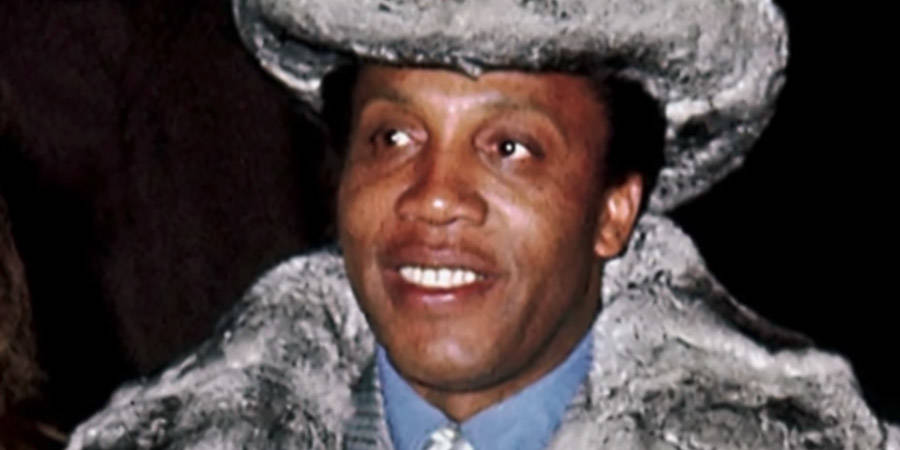
YouTubeFrank Lucas was another highly-successful heroin dealer in 1970s New York. Both Barnes and Lucas were depicted in Ridley Scott’s American Gangster.
In the waning days of hippiedom amid the rise of Vietnam, heroin, and Richard Nixon, however — Barnes was a resourceful hustler at the helm of an empire. His name spread from Harlem all over town, and soon, the world.
And before that, Barnes was just a Harlem boy with an alcoholic father. Born Leroy Nicholas Barnes on Oct. 15, 1933, he grew up on West 113th Street and Eighth Avenue. Though he spent part of his youth as an altar boy, he was also arrested for robbery before he was 10.
Barnes didn’t attend school after junior high, and after escaping his abusive home the young boy became a junkie on Harlem’s streets. Fortunately, he was sent to rehab in Lexington, Kentucky and said he never used drugs again.
Before his profitable business ventures, Barnes stole cars and routinely committed burglary. He was locked up in Lower Manhattan’s Tombs, as well as Green Haven Correctional Facility in upstate New York, where he converted to Islam.
And after his prison days ended, he started taking control of Harlem.
“Mr. Untouchable” Builds An Empire
Barnes’ criminal enterprise wasn’t just stunningly profitable, but highly deadly.
Leroy “Nicky” Barnes ran a tight, murderous ship and it gave him a supreme cockiness captured by his nickname, “Mr. Untouchable.” He simply felt that he could not be caught.
Evidence against him was routinely “lost.” Witnesses regularly “forgot” what they had seen, who they had seen, and couldn’t be sure enough to testify. Others simply went missing before they did.
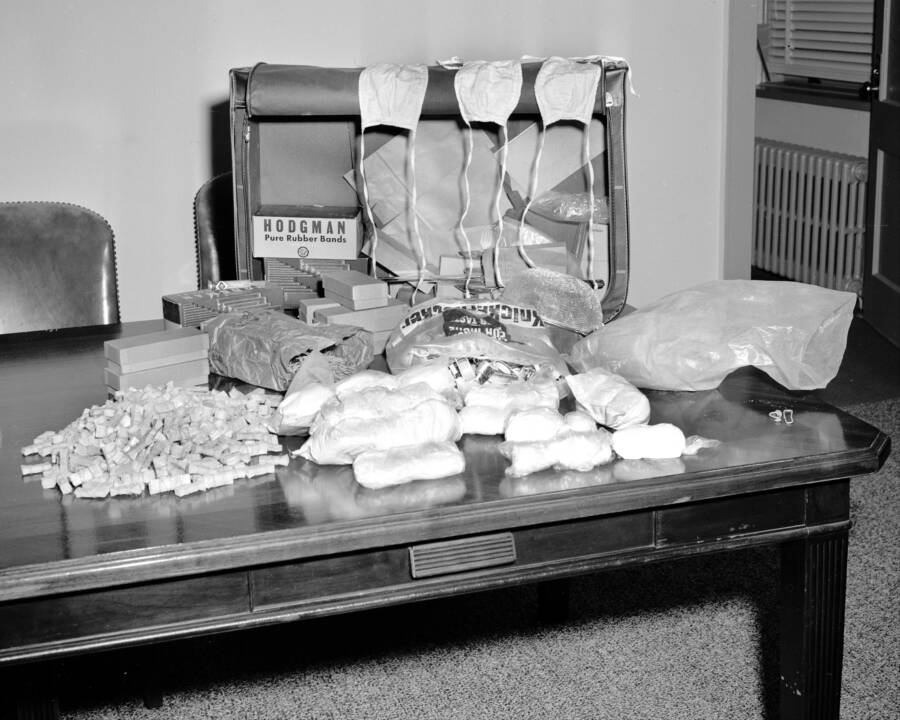
Gene Kappock/NY Daily News Archive/Getty ImagesHeroin, rubber bands, tape and surgical masks were confiscated in a drug raid tied to Barnes. He later testified that he helped import and distribute tens of thousands of pounds of heroin. Jan. 29, 1965.
In order to become “Mr. Untouchable,” Barnes got his start in New York’s criminal underworld as a competitor of the Italian Mafia — before partnering with them. In the late 1960s, he was importing and distributing heroin all over New York, Pennsylvania, Canada, and elsewhere.
The profits were in the millions while anyone standing in the way was murdered.
On one occasion, the police found $130,000 in cash in his car and $43,934 in his apartment. They also found a sawed-off shotgun and numerous handguns. Nonetheless, his wealth, power, and connections kept Barnes fairly protected from the law — for a while, at least.
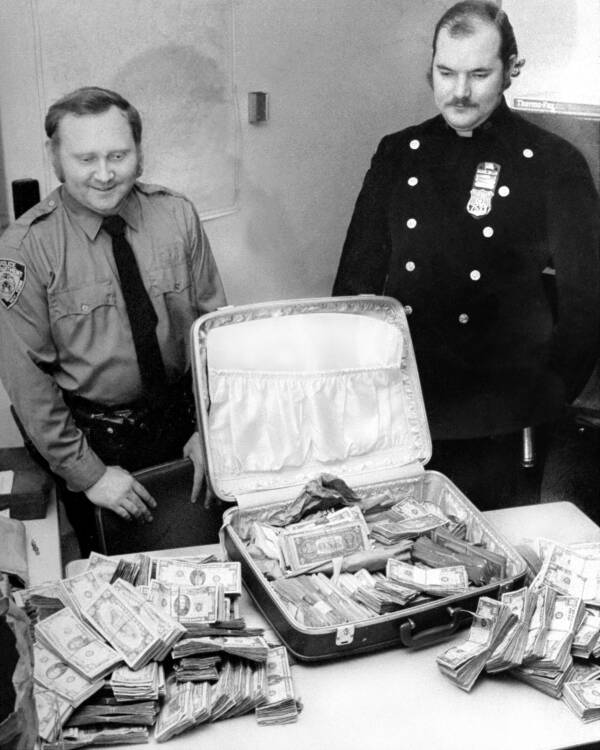
Carmine Donofrio/NY Daily News Archive/Getty ImagesPolice Officer’s Daniel Duffy (left) and Paul Von Werner of the 48th Precinct look over bribe money that was offered to them by Leroy “Nicky” Barnes. He stayed out of prison for another three years after this incident. Dec. 17, 1974.
He estimated he’d earned a minimum of $5 million before his 1977 conviction and he wisely invested these funds in legit businesses. Travel agencies, carwashes, gas stations — anything legal that could launder money was fair game.
And for a few short years, he really did seem untouchable.
The man’s ego ballooned to the point of publicity taunting authorities with the now-infamous magazine cover. He’d avoided convictions for so long that he presumably began to believe that his own nickname represented an undeniable fact. He had a record of 13 arrests as an adult with no convictions.
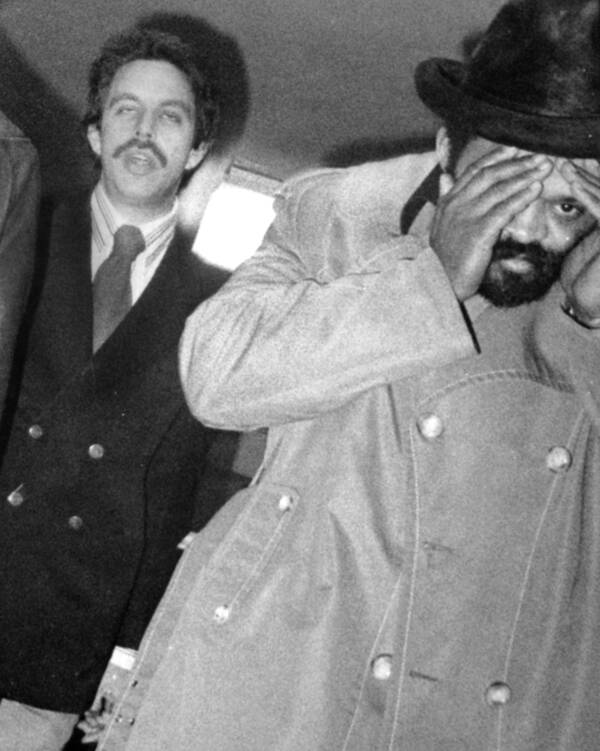
Jim Hughes/NY Daily News Archive/Getty ImagesLeroy “Nicky” Barnes covers his face as he leaves the Bronx Supreme Court for lunch, with a WPIX reporter (left) following him out. March 20, 1975.
President Jimmy Carter, who had just been sworn into office in 1977, was reportedly so displeased with Barnes’ pompous disrespect that he ordered the drug lord to be prosecuted as harshly as the law allowed.
“You can’t have The Times write about you if you are a gangster and expect to get away with anything,” said columnist Pete Hamill of the 1977 article. “Successful gangsters cannot be known.”
The Justice Department felt similarly and agreed with President Carter. Barnes was soon caught and sentenced to life in prison without parole later that year.
According to The New York Times, Barnes felt he was unfairly brought up on narcotics conspiracy charges — not because he was innocent of the crimes, but because the police didn’t catch him in the act. Barnes claimed they cheated their way to an arrest.
“The Constitution doesn’t allow prosecutors to convict people because they’re doing something morally wrong,” said Barnes. “Yeah, I was a drug dealer and I was doing everything they said I was doing. But they didn’t catch me at it. I’m not saying I was innocent.”
“I’m saying with all I was doing they could not get a conviction without a contrivance,” he said. He claimed the federal agents surveilling his empire’s phone lines mistakenly — or intentionally — transcribed the word “payroll” as “kilo.” As such, they were able to charge him.
A Drug Lord Becomes A Snitch
While the once rich, famous, and beloved hero of Harlem was now trapped behind bars, his former associates, his wife, and his numerous girlfriends used and abused his money. As they squandered the empire he had worked so long to build, Barnes felt cheated and double-crossed.
Thus, after decades of abiding by a certain code and adhering to the unofficial rules of the drug game, Barnes decided to pursue an entirely new, unorthodox option: working with the police.
He began testifying against other criminals in federal trials and, as a direct result, he helped put his ex-wife Thelma Grant behind bars for 10 years when she pleaded guilty to federal drug charges. Dozens of Barnes’ former colleagues faced similar fates.
As he testified, more about his own criminal past came to light.
“How much heroin did you and your organization buy and sell?” Barnes was asked by prosecutor Benito Romano during one of the trials of his former associates. “In the thousands of pounds,” Barnes replied.
But no matter how much Barnes had broken the law, he was now helping the government — and soon he was rewarded. Thanks to his cooperation, he was released from prison and into the federal witness protection program in 1998.
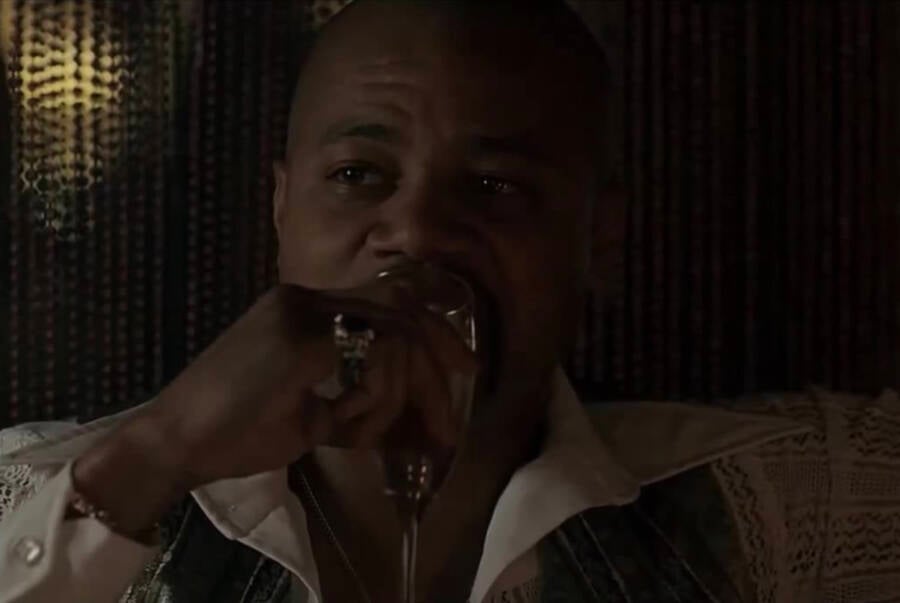
YouTubeCuba Gooding Jr. portrayed Leroy “Nicky” Barnes as a volatile, image-driven criminal.
Because his testimony against members of the criminal underworld of which he had once been a part now made him a target, authorities provided Mr. Untouchable with a shot at a new life by giving him a new identity entirely in the program.
“The anonymity that cloaks Middle America is the life I’m comfortable with, and what I want to be,” he stated in 2007. “I want to get up every day and get in the car and go to work and be a respected member of my community. And I am respected.”
The Legacy Of Leroy “Nicky” Barnes
In the 14 years since his release and before his death in 2012, Barnes’ legacy received a significant boost. The once-famous drug dealer had been gone and forgotten in the criminal underworld but was now getting the spotlight in pop culture. First came the Tom Folsom book Mr. Untouchable, a documentary of the same name, and then the Ridley Scott film American Gangster in 2007.
However, Mr. Untouchable was famously frustrated that the Denzel Washington movie sidelined the story of Nicky Barnes (portrayed by Cuba Gooding Jr.) in favor of Frank Lucas, a competitor and associate of Barnes. Nonetheless, Barnes was grateful for his story being told, though he didn’t seem to miss his past.
“I’m not looking in the rearview mirror to see if anyone is tailing me anymore,” he said. “I don’t turn on the blender when I’m at home so I can talk. That is not a part of my life. Sure, I’d love to have more money, but I am not willing to do anything but go to my job to get it.”
In the end, the New York heroin wars of the 1970s — its personalities, mesmerizing stories of corruption, and shockingly casual violence — have been a tremendous source of interest for writers, filmmakers, artists, and crime history buffs.
Jim Croce’s “Bad, Bad Leroy Brown,” for instance, was inspired by Barnes’ captivating life story. Wesley Snipes used Barnes as a template for his Nino Brown character in New Jack City. All in all, Barnes became a folk hero of sorts whose legend persisted across several generations.
“He was the No. 1; he had charisma,” explained Sterling Johnson Jr., a former special narcotics prosecutor in New York City and a federal judge.
Upon learning of Barnes’ death last week, Robert Fiske Jr. — the United States attorney in Manhattan in 1977 — described the Harlem figures as having managed “the largest, the most profitable and the most venal drug ring in New York.”
For Barnes’ daughters, meanwhile, the drug-profiteering kingpin was somebody else entirely — their loving father who’d eventually turned his life around.
“It’s hard for us to think of ‘Mr. Untouchable’ as being the same person as our dad,” they said. “By the time we were old enough to understand what he had done, we had so many positive experiences with him.”
Fortunately, those experiences are likely what they’ll remember about the man.
After learning about the life and death of Harlem drug lord Leroy “Nicky” Barnes (a.k.a. “Mr. Untouchable”), take a look at the life of infamous drug dealer George Jung and the true story behind the movie Blow. Then, learn about the wild life of cocaine kingpin Pablo Escobar.





